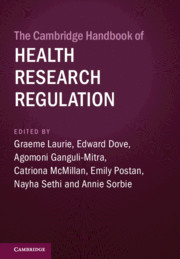The Cambridge Handbook of Health Research Regulation
The first ever interdisciplinary handbook in the field, this vital resource offers wide-ranging analysis of health research regulation. The chapters confront gaps between documented law and research in practice, and draw on legal, ethical and social theories about what counts as robust research regulation to make recommendations for future directions. The handbook provides an account and analysis of current regulatory tools – such as consent to participation in research and the anonymisation of data to protection participants’ privacy – as well as commentary on the roles of the actors and stakeholders who are involved in human health research and its regulation. Drawing on a range of international examples of research using patient data, tissue and other human materials, the collective contribution of the volume is to explore current challenges in delivering good medical research for the public good and to provide insights on how to design better regulatory approaches. This title is also available as Open Access on Cambridge Core.
Graeme Laurie is Professorial Fellow and Founding Director of the J. Kenyon Mason Institute, Edinburgh Law School, University of Edinburgh. He was the Principal Investigator on the Liminal Spaces Project (2014–2021).
Edward Dove is Lecturer in Health Law and Regulation and a Deputy Director of the Mason Institute.
Agomoni Ganguli-Mitra is Lecturer in Bioethics and Global Health Ethics at the Mason Institute.
Catriona McMillan is a Senior Research Fellow in Medical Law and Ethics and a Deputy Director of the Mason Institute.
Emily Postan is Senior Research and Teaching Fellow in Bioethics and a Deputy Director of the Mason Institute.
Nayha Sethi is Chancellor’s Fellow in Data Driven Innovation and a Deputy Director of the Mason Institute.
Annie Sorbie is Lecturer in Medical Law and Ethics and a Deputy Director of the Mason Institute.

